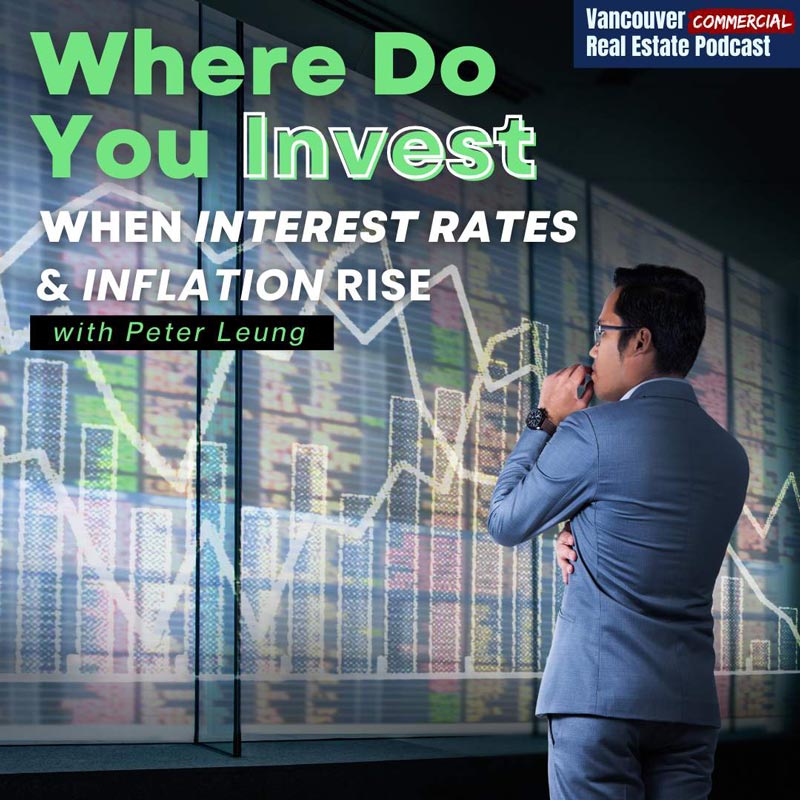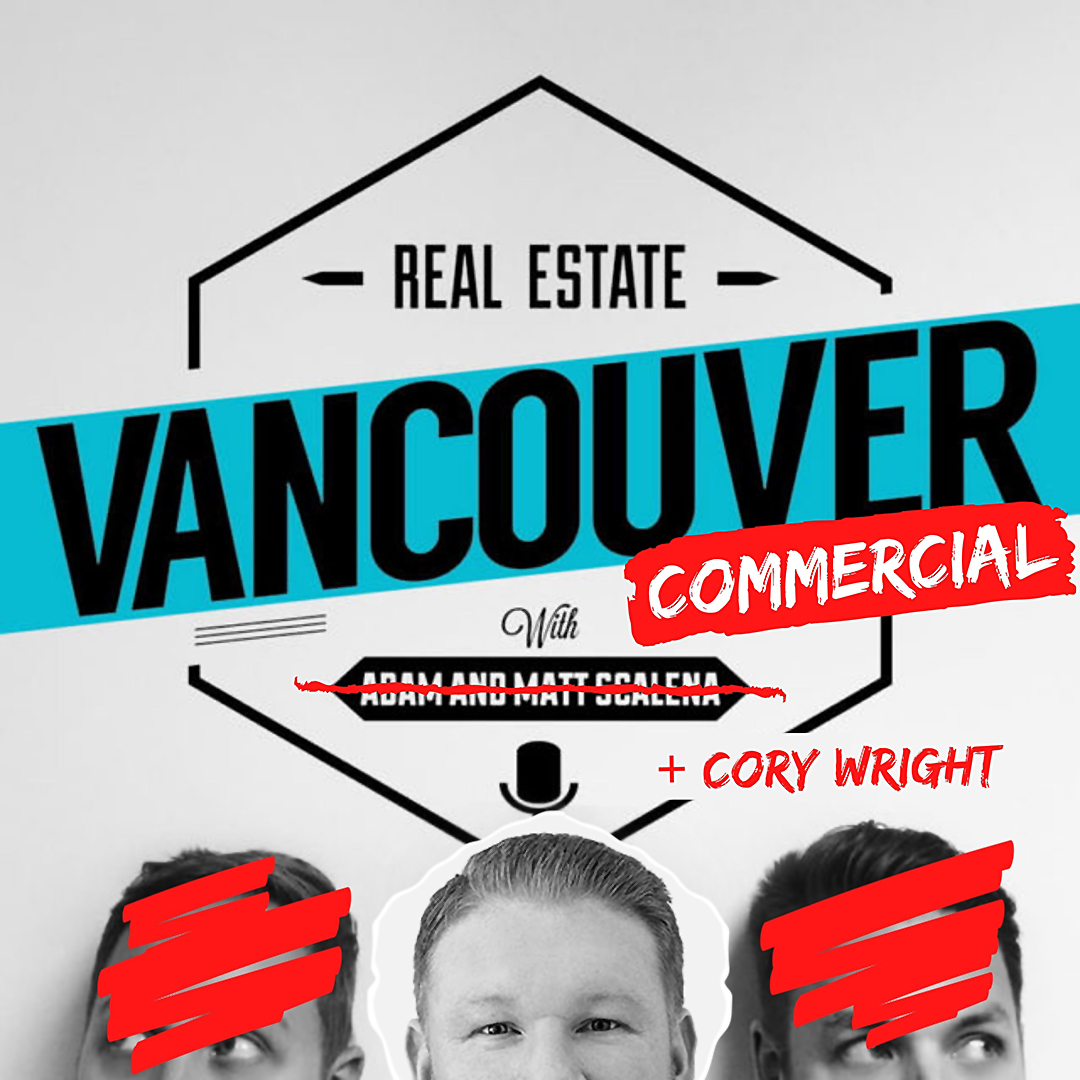
Powered by RedCircle
They’re back! After a couple of weeks hiatus, Cory got even fatter and almost drowned in the Pacific Ocean, while Matt was busy adding even more abs to his already chiseled stomach thanks to F45. But the boys are now back, and to kick off the second half of the season is none other than international commercial real estate investor Peter Leung!
As the world continues to cope with rising inflation and interest rates, Peter tells us how his portfolio is (or isn’t) affected and what markets have bounced back quicker than others. Peter also discusses what BC markets he likes and where he is looking to grow his holdings. In this ever-changing investing environment, this is an episode you will want to tune in for.
Who is Peter Leung?
I’m a global real estate investor and invest in both residential and commercial real estate in Canada, the US, the UK and parts of Asia. I also invest in the stock market and things like art and Chinese tea.
I started in the financial industry because I wanted to understand how money worked. I soon realized a 9-5 wasn’t going to work for me but I still wanted to get ahead somehow. I wanted to change things for me and my family. Real estate was a way for people to save money and so that became my focus. I wanted to generate passive income.
What was your first real estate deal?
I first got involved in residential real estate in Vancouver, buying my first piece of property as a presale. My family was very anti-debt and didn’t believe in a mortgage for anything other than what you live in. They were very angry when they found out about my first presale purchase. It wasn’t until four properties in that I got my family’s blessing.
In 2018, my father became a real estate investor himself, learning that there was a better way. But he swears it wasn’t because of me! Real estate really changed our family tree for generations to come.
How did you get into commercial real estate and begin investing in real estate abroad?
At that time, there were very few restrictions on TDSR (total debt service ratio) – so you could buy a lot of presales at just 5%. I saw a lot of Asian capital entering into the Canadian economy. So I followed the trend, buying 15-16 presales in total. I was able to turn them around and assign them, making it into a business.
But at a certain point, TDSR and income became an issue. I wasn’t able to finance any more residential properties. So I started to look for another way to make money with real estate.
That’s when I found commercial real estate. With commercial real estate, the banks don’t care who Peter is – they care who my tenant is. My goal was to find the best tenant that the bank would finance. So that’s what I did. There was no limit to how many mortgages or how big a property I could buy. I just had to find the best tenants and I could get up to 90% financing.
My motto became: If this works, how fast can I do it? I expanded into commercial real estate in Vancouver and then began to look at commercial real estate globally.
How do you select real estate markets? What does an opportunity look like?
I realized that my biggest capital partner was the bank; I saw them as a partner, not just a lender. What is my partner looking for? They’re looking for great tenants. So I used that as my criteria for vetting my deals. The banks could tell me if a potential property was a good deal or not because they would have to do their own research.
I stayed away from office and looked into retail. I found tenants like Shoppers Drugmart and Loblaws, Tesco in the UK, etc. It was less about location and more about what kind of tenants I could get. Finding a AAA or at least a AA tenant was my criteria.
How important is a real estate team?
Cory and I met on a deal; he was on the selling side and I was on the buying side. Your team in real estate is incredibly important. I bought a property that I saw William Wright post on social media. I entered the UK market during the July Brexit vote; within 24 months of Brexit, I bought 46 properties in the UK. I lived in Hong Kong then, so it was all about the local team.
With covid, I started buying more in Canada and the US. I have diversity in my portfolio thanks to the people I work with. I haven’t travelled much since covid but I am able to continue growing thanks to my team and our relationships. I never see myself as the smartest guy but I hire the smartest people who know their market better than anyone else.
How are real estate markets reacting to covid and increasing interest rates?
We saw during the early days of covid that massive amounts of money had to be printed. Now that it has been printed, governments are wanting to raise interest rates as quickly as possible. With an increasing rate situation globally, and because I’m invested in different markets, I’m able to take advantage of changing exchange rates.
Going forward, I believe certain assets will still remain strong – places like storage facilities, data centres, warehouses, etc. Anything around digitalization, AI and robotics is still a hot topic. I believe they will continue to grow. Then there are other assets I will continue to stay away from for the foreseeable future, like office. There is less possible demand with office real estate.
I’m looking for longer leases today that will hedge against inflation, allow me to have appreciation and provide constant AAA cash flow.
As interest rates increase, major corporations will continue to buy. So I’m now looking at corporations as partners, as well as banks. But many individual investors will get priced out. Lenders will be less willing to invest and many people won’t be able to qualify due to cash flow.
So you need to identify the right markets and the right investors during high interest rate periods. Vancouver is one of those places that will continue to thrive with high demand. Hong Kong also has a very transactional and buoyant real estate market.
What real estate markets in BC are you looking at?
The BC real estate markets I love include Maple Ridge, Nanaimo and Chilliwack. These secondary markets have tremendous population growth. People are changing their lifestyle so they can work from home. That’s where I’m investing my capital and where I think the opportunities are.
How should investors change their strategy during this time?
In the UK, I focused a lot on residential real estate but since covid, I haven’t bought a single property. In Canada, focusing on strong tenancy is very important.
It is more challenging for the mom and pop investors right now, but this is also a time of great opportunity. People will shy away and hold off, which is the perfect time to find those hidden gems. There are still a lot of people selling. How can you be creative and identify those opportunities?
Look at properties under $4-5 million, even sub $2 million. It’s okay to buy a smaller property, as long as there’s a great tenant. That can be a fundamental property to start building your portfolio. Nobody knows the bottom or the top of the market; the key is to stay invested and buy well.
I’d encourage mom and pop investors to look at commercial real estate over residential. I don’t really believe in multi-family as I think there are risks with job loss if the economy turns. I continue to love retail where good tenants are still available in today’s climate.
I am full steam ahead but I’m prudent about what I buy and how much I’m spending. I want to find the opportunities people are missing and be creative. I want to turn properties around and put great tenants in. It’s a great time to build your CV and prove to the lenders and other partners what you can do.
Talk to us about your other investments outside of real estate.
Besides art, I’m also invested in tea and watches. Art is very transactional and has been strong over covid. Watches have improved a lot over the last two years. I’ve come to learn a lot about tea, seeing growth of over 100% a year. I’ve amassed a collection due to demand.
I enjoy these areas of investment and like to get involved in these collections. Many have done very well during covid and are very different from real estate.
What advice would you give a real estate investor during a time of high inflation and high interest rates?
Have a very clear relationship with your lender. This is the time to build solid foundations. How can you identify opportunities with your lender? I’ve been sent many deals because I’ve asked my lenders if they know anyone looking to sell.
Find out more:
Investorpreneur Podcast
Instagram @iampeterleung
LinkedIn @ Peter Leung
For all the curious minds interested in commercial real estate investing, grab a coffee and pull up a chair because we have exclusive stories and tips from commercial real estate brokers, investors, developers, economists, urban planners, and everyone in-between. From the successes and failures to the motivations and lessons learned, the Vancouver Commercial Real Estate Podcast is your insight into commercial real estate in Vancouver, Victoria, Kelowna, and beyond.
What's the best real estate market to invest in? What are the commercial real estate asset classes and property types? Hosted by Cory Wright, founder of William Wright Commercial, and co-hosts Adam and Matt Scalena of the Vancouver Real Estate Podcast, our podcast opens the door to real estate investing for everyone from beginner investors to experienced real estate professionals. New episodes are released every Tuesday. Follow the Vancouver Commercial Real Estate Podcast on Apple Podcasts, Spotify, Google Podcasts, or your favourite streaming platforms.

This communication is not intended to cause or induce breach of an existing agency agreement. E&OE: All information contained herein is from sources deemed reliable, and have no reason to doubt its accuracy; however, no guarantee or responsibility is assumed thereof, and it shall not form any part of future contracts. Properties are submitted subject to errors and omissions and all information should be carefully verified. All measurements quoted herein are approximate.
ⓒ William Wright Commercial Real Estate Services 2024
Proudly designed by Burst Creative